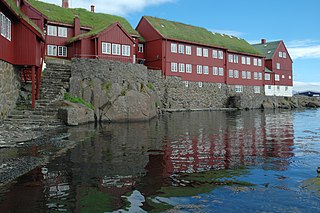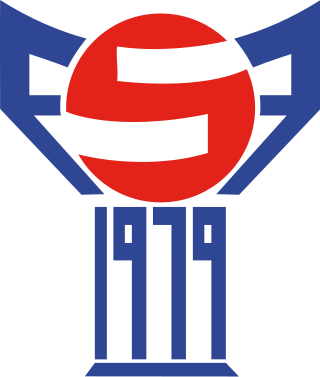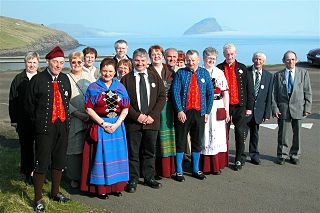
The early details of the history of the Faroe Islands are unclear. It is possible that Brendan,an Irish monk,sailed past the islands during his North Atlantic voyage in the 6th century. He saw an 'Island of Sheep' and a 'Paradise of Birds',which some say could be the Faroes with its dense bird population and sheep. This does suggest however that other sailors had got there before him,to bring the sheep. Norsemen settled the Faroe Islands in the 9th or 10th century. The islands were officially converted to Christianity around the year 1000,and became a part of the Kingdom of Norway in 1035. Norwegian rule on the islands continued until 1380,when the islands became part of the dual Denmark–Norway kingdom,under king Olaf II of Denmark.
The politics of the Faroe Islands,an autonomous country of the Kingdom of Denmark,function within the framework of a parliamentary,representative democratic dependency,whereby the Prime Minister of the Faroe Islands is the head of government,and of a multi-party system. The Faroe Islands are politically associated with the Kingdom of Denmark but have been self-governing since 1948. Executive power is exercised by the government. Legislative power is vested in both the government and the Løgting. The judiciary is independent of the executive and the legislature and the responsibility of Denmark.

The economy of the Faroe Islands was the 166th largest in the world in 2014,having a nominal gross domestic product (GDP) of $2.613 billion per annum. GDP increased from DKK 8 billion in 1999,to 21 billion in 2019. The vast majority of Faroese exports,around 90%,consists of fishery products.
Faroese is a North Germanic language spoken as a first language by about 69,000 Faroe Islanders,of which 21,000 reside mainly in Denmark and elsewhere.

Tórshavn,usually locally referred to as simply Havn,is the capital and largest city of the Faroe Islands. It is located in the southern part on the east coast of Streymoy. To the northwest of the city lies the 347-meter-high (1,138 ft) mountain Húsareyn,and to the southwest,the 350-meter-high (1,150 ft) Kirkjubøreyn. They are separated by the SandáRiver. The city itself has a population of 14,099 (2024),and the greater urban area has a population of 23,194,including the suburbs of Hoyvík and Argir.

The Løgting is the unicameral parliament of the Faroe Islands,an autonomous territory within the Danish Realm.

The Faroe Islands national football team represents the Faroe Islands in men's international football,and is governed by the Faroe Islands Football Association (FSF). The FSF became a member of FIFA in 1988 and UEFA in 1990 and represents the fourth-smallest UEFA country by population.

The Faroe Islands Football Association,or FSF,is the governing body of all domestic football in the Faroe Islands,the highest level of which is the Faroe Islands Premier League. It also runs the Faroe Islands national teams for men and women. Established in 1979,it is based in Tórshavn.

Faroese people or Faroe Islanders are an ethnic group native to the Faroe Islands. The Faroese are of mixed Norse and Gaelic origins. About 21,000 Faroese live in neighbouring countries,particularly in Denmark,Iceland and Norway. Most Faroese are citizens of the Kingdom of Denmark,in which the Faroe Islands are a constituent nation. The Faroese language is one of the North Germanic languages and is closely related to Icelandic and to western Norwegian varieties.

The Faroe Islands has a small population,and due to the high initial cost of filmmaking,the islands cinema history is modest. The first film director of the Faroe Islands was Katrin Ottarsdóttir. Her first film set in the Faroe Islands was Atlantic Rhapsody in 1989.

The Danish Realm,officially the Kingdom of Denmark,or simply Denmark,is a sovereign state and refers to the area over which the monarch of Denmark is head of state. It consists of metropolitan Denmark—the kingdom's territory in continental Europe and sometimes called "Denmark proper" —and the realm's two autonomous regions:the Faroe Islands in the North Atlantic and Greenland in North America. The relationship between the three parts of the Kingdom is also known as The unity of the Realm.

The following outline is provided as an overview of and topical guide to the Faroe Islands:

The Faroe or Faeroe Islands,or simply the Faroes,are an archipelago in the North Atlantic Ocean and an autonomous territory of the Kingdom of Denmark. The official language of the country is Faroese,which is closely related to and partially mutually intelligible with Icelandic.
Dan Michael Knudsen was the High Commissioner of the Faroe Islands until 2017. Knudsen was appointed to the office in 2008,succeeding Søren Christensen. He previously worked in the Department of Finance in the Faroese Home Rule Government,1997–2000:
Søren Christensen is a Danish politician who served as High Commissioner of the Faroe Islands from 2005 to 2008. Previously,he was Secretary General of the Nordic Council of Ministers from 1997 until 2003.

The High Commission of Denmark in the Faroe Islands is a Danish institution in the Faroe Islands.
Events in the year 2019 in the Faroe Islands.









